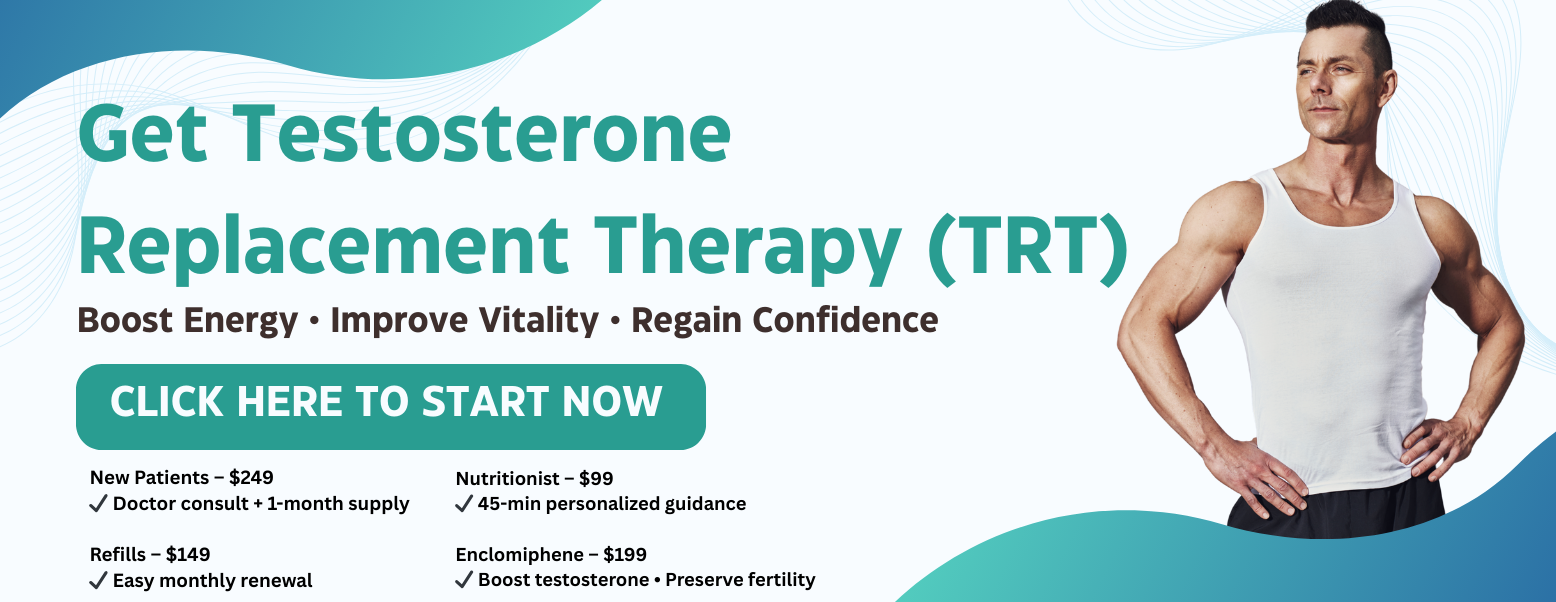Feeling sluggish, put on a little weight despite the workout routine, struggling to get enough sleep, and your sex drive has seemingly vanished? You’re not alone—millions of men feel these things because they are experiencing the downward spiral of testosterone. In the last few years, testosterone replacement therapy (TRT) has been one of the most popular solutions. But is it actually working? Or is it a trend?
In 2025, TRT is no longer an abstract idea with build results that vary from patient to patient. With personalized diagnostics, telemedicine, and improved delivery methods, TRT is delivering accurate, actionable results in men of all ages (from younger men in their 30s to midlife and older men). The process of testosterone optimization is nothing less than life-changing.
Don’t Wait, Reclaim Your Vitality – Click here to Book Your TRT Consultation Now!
In this guide, we will outline how testosterone replacement therapy works, how fast testosterone acts, and what results can be expected. We will also provide background on the important factors that will influence success and how thousands of men have trusted The KIF to deliver clinical-led, results-based plans for testosterone replacement therapy.
Let’s get started!
How Long Does It Take for TRT to Work in 2025? A Phase-by-Phase Timeline
Many men beginning TRT want to know when they will notice a performance difference.
While you won't feel a switch flip instantly, that is likely a good thing! Testosterone affects different systems at different rates and is a natural, systematic progression. By 2025, with better diagnostic testing and smarter therapy plans, most men will follow a similar path to noticeable change!
Here is what you can expect over time:
First 7–14 Days: Initial Hormonal Shifts Begin
Your testosterone levels will begin to rise, especially with fast-acting formulations (i.e., testosterone cypionate injections).
What You May Notice:
- Light mood lift
- Less brain fog and better mental clarity
- Slightly increased erections in the morning
- Mild lift in energy afternoon
- Improved sense of optimism
These changes are largely neurological, as your brain is stimulated by improved hormones in your body.
Week 3 to Week 6: Enhanced Libido, Energy, and Motivation
This is when you will notice you have more energy and are more motivated to be active. Your testosterone has fortified dopamine and blood production, allowing for better mental and physical performance.
What to Expect:
- Increased sexual desire
- Stronger erections
- Performance in the gym is better
- More emotional stability
- Less anxiety or sadness
At this point, most men will start to feel more like themselves.
Weeks 7 to 12: Physical Strength, Muscle Tone, and Fat Loss
From this point forward, testosterone will start to have a more pronounced effect on your metabolism and your muscle mass, especially when combined with appropriate strength training and healthy nutrition.
Visible Improvements:
- Increased muscle mass
- Decreased belly fat
- Reduced muscle soreness from workouts
- Your arms, legs, and chest will be more defined
- Your lab values (cholesterol, blood sugar) and overall health are getting better
The combination of your effort in the gym and in the kitchen is starting to bear visible fruit.
Months 4 to 6: Deep Neurological and Cardiovascular Benefits
At this stage, TRT will make an impact on deeper physiological systems.
Mid-Term Benefits:
- Clearer memory and focus
- Increased drive and ambition
- Improved cardiovascular fitness
- Healthier cholesterol reading
- Less visceral fat
This is usually where many men say they feel like they've started to age in reverse. It will be tangible.
Months 7 to 12: Long-Term Body Composition and Bone Density Shifts
By this stage, you have been receiving consistent TRT, and your whole system should be functioning optimally.
Long-Term Outcomes:
- Greater bone density (as seen in DXA scans)
- Youthful skin and hair
- Improved immune response
- Increased fertility (with medical assistance)
- Stable energy and testosterone feedback loops
This is the stage that you will shift from TRT to sustainable lifestyle changes.
Factors That Influence TRT Effectiveness in 2025
TRT experiences differ for each individual. The effectiveness of TRT is a function of one's unique biology, medical management, and individual lifestyle choices. The cornerstones of successful TRT are:
Type and Severity of Testosterone Deficiency
Identifying the etiology of the testosterone deficiency will provide information for treatment management.
Types of Deficiencies:
- Primary Hypogonadism is often genetic, with incomplete testicular hormone production; patients usually have a good response to TRT.
- Secondary Hypogonadism pituitary/testicular function can be a challenge due to coexisting hormone systems. With a careful, multi-faceted approach, we can help people establish a good response.
- Age-related testosterone decline is gradual, and the physical status of the person can provide insight into the patient's overall health.
The severity of deficiency: Testosterone levels <200 ng/dL usually provide a faster and greater outcome.
Choice of TRT Delivery Method
Selecting the best practical delivery mode depends on the individual, their lifestyle, preferences, and medical history.
- Injectables (e.g., testosterone cypionate/enanthate): Reliable and very strong.
- Topical Gels/Creams: Convenient but inconsistent.
- Pellets: Long-term but less convenient.
- Oral Capsules (testosterone undecanoate): Improving but remaining investigational.
- Patches: Consistent delivery, although some local side effects may occur.
Each option has trade-offs in terms of consistency of absorption, side effects, and user experience.
Dosage Precision and Hormonal Balance Monitoring
TRT is not a "set it and forget it" treatment, and the dose may need to be adjusted regularly.
Why It Matters:
- Too much testosterone can lead to unwanted side effects of estrogen.
- Too little testosterone may change little.
- Key markers to monitor may include estradiol, sex hormone-binding globulin (SHBG), and hematocrit.
At The KIF we offer patients a monthly update with lab reviews to maintain progress.
Metabolic and Lifestyle Factors
TRT magnifies what’s already in your body. So, the healthier your habits, the better your outcomes.
Key Lifestyle Elements:
- Eat nutrient-dense foods (most importantly zinc and omega 3's)
- Weightlifting and activity
- Prioritize sleep
- Stress management
- Body fat reduction
- Patterning your lifestyle changes to ensure the best testosterone response.
Age and Biological Responsiveness
Generally speaking, younger men may have a faster response, but age is not an exclusion factor.
- Younger men (30s–40s): Recovery physically and psychologically can be more rapid
- Older men (50s+): Response may take longer, but can still produce substantial effects with the appropriate managing support.
Older men just require supporting treatment, to be more specific.
Genetics and Androgen Receptor Sensitivity
Variations in the structure of androgen receptor genes affect how our tissues respond to testosterone.
We refer to the instability of androgen receptor lengths as CAG repeats in the nuclear receptor complex:
- Shorter CAG repeats = better (stronger) testosterone response.
- Longer CAG repeats mean a slower response (or, more likely, overall, require higher doses of testosterone).
More science is emerging, but this can explain variability in patient responses - especially in very low doses.
Pre Existing Medical Conditions
Some medical pathologies will limit, at the least, the effectiveness of TRT.
Conditions That Blunt or Complicate Results:
- Type 2 diabetes or obesity
- Thyroid issues
- Untreated sleep apnea
- Liver condition/dysfunction or Kidney dysfunction
This is why The KIF does all its evals in understanding all of the risks prior to starting TRT.
Adherence and Consistency in the Treatment Plan
The best results can only happen if you are going to be on the treatment as prescribed.
What Adherence Looks Like:
- Adhere to the treatment schedule
- Complete labs and follow-ups
- Listen to your provider
- Make lifestyle changes
The KIF helps by providing monthly medications, reminders, and virtual visits to help you stay engaged and empowered.
Common Signs TRT Is Working
Wondering if you are on the right track? If you notice these signs, there is a good chance your TRT treatment is starting to take effect:
You Notice a Consistent Rise in Energy and Reduced Fatigue Levels
Gone are the days of dragging yourself through the day or constantly caffeinating yourself.
What to Look For:
- Waking each morning feeling refreshed
- Afternoon feeling stable
- Less caffeine and nap dependence
If energy levels do not improve in 6 weeks, your provider will typically adjust your dose.
Your Libido and Sexual Performance Improve Dramatically
Sexual drive is generally one of the first changes and usually the most dramatic.
What to Look For:
- Morning erections return
- Desire and performance increase
- More satisfying intimacy
If libido is not improving, further testing of estradiol and SHBG will likely be needed.
You're Building Muscle, Losing Fat, or Both
Look closely in the mirror and see if your clothes fit differently.
What to Look For:
- Leaner frame; Tighter jawline
- More muscle tone is visible
- Weight changes with body recomp
If no changes after 3-6 months, labs or method of delivery can be further assessed.
Your Mood, Confidence, and Mental Clarity Improve
The essential markers of increased focus, confidence, emotional resilience, and calmness.
What to Look For:
- Better focus and sharper memory
- Less irritability
- More social confidence
- Less anxiety
If you don't feel any change, I suggest you check your thyroid and cortisol levels.
Your Lab Values Reflect Hormonal Optimization
Your lab work should reflect the changes you see in your body.
Ideal Ranges (Depending on Age and Baseline):
- Total T: 600 - 1000 ng/dL
- Free T: 15 - 30 ng/dL
- E2: 20 - 40 pg/mL
- Hematocrit: under 52%
If your lab work deviates from the targets, you know you need to make an adjustment.
Your Confidence and Motivation Start Leading Daily Decisions
You aren't just surviving... you're thriving.
What to Look For:
- You have career motivation again
- You are engaging in social activities again
- Goals are exciting again
- You change from a reactive mindset to a proactive mindset
This is the best indicator of you being on the right TRH track.
Conclusion
TRT isn’t just a risk in 2025; it’s a medically researched and reasonable health plan. Certainly, with the right conditions, stamina, and reasonable support, testosterone therapy provides more than optimism. It provides results.
If you are looking to get your energy back, rebuild strength, or improve focus The KIF offers you a reasonable and safe option.
Free Consult – $0: Get professional advice without the pressure.
New Patient Plan - $249: Telehealth assessment, lab review and one month of medication.
Monthly TRT Plan - $149/month: Your treatment is delivered on time and monitored by a physician with easy support.
If you're ready to take control, The KIF is here to help.
 Since 2021, Kif offers a streamlined platform to get a medical marijuana card online. We have served more than 45K patients across the United States. Sign Up Now to get the right to use medical cannabis for your health condition without any delay.
Since 2021, Kif offers a streamlined platform to get a medical marijuana card online. We have served more than 45K patients across the United States. Sign Up Now to get the right to use medical cannabis for your health condition without any delay.
























